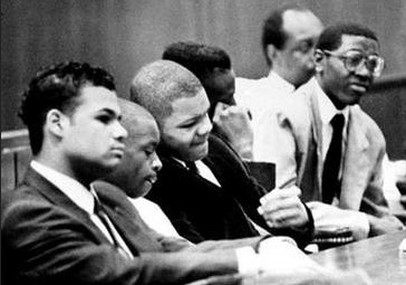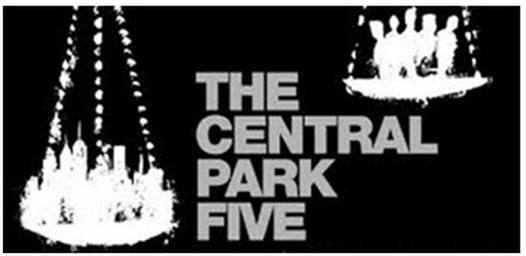
CAST & CREDITS
A Documentary
Directed by Ken Burns, David McMahon
& Sarah Burns
Featuring Ed Koch, David Dinkins,
Craig Steven Wilder, Calvin O. Butts III, Jim Dwyer, Natalie Byfield, Michael WarrenKevin Richardson, Raymond Santana, Yusef Salaam
and Korey Wise
No MPAA rating (language, some violent images)
Running time: 1 Hour 59 Minutes
A Documentary
Directed by Ken Burns, David McMahon
& Sarah Burns
Featuring Ed Koch, David Dinkins,
Craig Steven Wilder, Calvin O. Butts III, Jim Dwyer, Natalie Byfield, Michael WarrenKevin Richardson, Raymond Santana, Yusef Salaam
and Korey Wise
No MPAA rating (language, some violent images)
Running time: 1 Hour 59 Minutes
Reviewed by Michael Phillips
"The Central Park Five" is an unusually good documentary about an outlandish miscarriage of justice.
On an April night in 1989, Trisha Meili was beaten, raped and left for dead not far from a path in Manhattan's Central Park. Five boys between the ages of 14 and 16 signed confessions regarding the attack, which was the worst of several criminal incidents unfolding in the area that night.
The boys were African-American and Latino: Antron McCray, Kevin Richardson, Yusef Salaam, Raymond Santana and Korey Wise, all present, anguished, reflective and accounted for in "The Central Park Five." (McCray declined to be filmed, but his voice is heard throughout.) The victim, who eventually came out of a coma, was white. U.S. Supreme Court Justice Clarence Thomas may have been the one to complain about a "high-tech lynching" two years later, but surely this was the racially inflamed news story deserving of that phrase.
The teenagers served several years in correctional facilities. Then, turnabout: DNA evidence exonerating the five came to light. That, plus a 2002 confession made by serial rapist Matias Reyes — who admitted his guilt to one of the wrongly accused while both were in the same prison — served to free the Central Park five.
Why did they sign confessions if they weren't guilty? The film focuses, intently, on this question, before dealing with much more. There's a sobering moment late in the picture when the holdout juror who believed the boys innocent (but cast a "guilty" verdict anyway) tells us: "I just went along with it at the end because frankly I was wiped out." This is the very reason the boys themselves signed confessions years earlier: the NYPD, under pressure from above, grilled the five, who didn't really know what was happening to them, into exhausted submission. They fit the bill. Their confessions gave the police the win they needed for public-relations purposes. The boys were admittedly out "wilding," as the newly coined phrase had it, to begin with, stirring up trouble in the park. And expedience led to injustice.
"The Central Park Five" comes from, among others, Ken Burns, the man who made "The Civil War," "Jazz" and other broadly expansive works in the documentary genre. The project began with his co-director and daughter, Sarah Burns, and her book on the Central Park Five. (David McMahon is the co-producer, co-writer and co-director.) Their interview subjects range from ex-mayors to reporters to historians to family members (but not to the victim herself). The innocence of the five at the center failed to garner the same attention as their rush-to-judgment guilt. This film is a fine, strong corrective.
"The Central Park Five" is an unusually good documentary about an outlandish miscarriage of justice.
On an April night in 1989, Trisha Meili was beaten, raped and left for dead not far from a path in Manhattan's Central Park. Five boys between the ages of 14 and 16 signed confessions regarding the attack, which was the worst of several criminal incidents unfolding in the area that night.
The boys were African-American and Latino: Antron McCray, Kevin Richardson, Yusef Salaam, Raymond Santana and Korey Wise, all present, anguished, reflective and accounted for in "The Central Park Five." (McCray declined to be filmed, but his voice is heard throughout.) The victim, who eventually came out of a coma, was white. U.S. Supreme Court Justice Clarence Thomas may have been the one to complain about a "high-tech lynching" two years later, but surely this was the racially inflamed news story deserving of that phrase.
The teenagers served several years in correctional facilities. Then, turnabout: DNA evidence exonerating the five came to light. That, plus a 2002 confession made by serial rapist Matias Reyes — who admitted his guilt to one of the wrongly accused while both were in the same prison — served to free the Central Park five.
Why did they sign confessions if they weren't guilty? The film focuses, intently, on this question, before dealing with much more. There's a sobering moment late in the picture when the holdout juror who believed the boys innocent (but cast a "guilty" verdict anyway) tells us: "I just went along with it at the end because frankly I was wiped out." This is the very reason the boys themselves signed confessions years earlier: the NYPD, under pressure from above, grilled the five, who didn't really know what was happening to them, into exhausted submission. They fit the bill. Their confessions gave the police the win they needed for public-relations purposes. The boys were admittedly out "wilding," as the newly coined phrase had it, to begin with, stirring up trouble in the park. And expedience led to injustice.
"The Central Park Five" comes from, among others, Ken Burns, the man who made "The Civil War," "Jazz" and other broadly expansive works in the documentary genre. The project began with his co-director and daughter, Sarah Burns, and her book on the Central Park Five. (David McMahon is the co-producer, co-writer and co-director.) Their interview subjects range from ex-mayors to reporters to historians to family members (but not to the victim herself). The innocence of the five at the center failed to garner the same attention as their rush-to-judgment guilt. This film is a fine, strong corrective.






